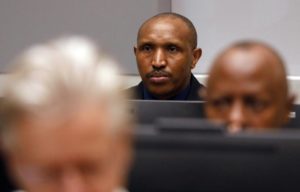By: Madison Kenyon
Impunity Watch Staff Writer
KINSHASA, Congo — On July 8, 2019, the International Criminal Court (ICC) found Bosco Ntaganda guilty. The Court convicted him of 13 counts of war crimes, including: murder and attempted murder, intentionally directing attacks against civilians, rape, sexual slavery, ordering the displacement of the civilian population, conscripting and enlisting children under the age of 15 years into an armed group and using them to participate actively in hostilities, intentionally directing attacks against protected objects, and destroying the adversary’s property; and five counts of crimes against humanity, including: murder and attempted murder, rape, sexual slavery, persecution, and forcible transfer and deportation. Ntaganda is only the fourth person to be convicted by the ICC and the first person to be convicted of sexual slavery.

Ntaganda’s crimes date back to before 2003. These crimes specifically arise from his involvement with the Patriotic Forces for the Liberation of Congo (FPLC), of which he was the Deputy Chief of Staff and commander of operations. Despite the ICC’s prosecutor beginning her investigation on June 21, 2004, an arrest warrant was not issued until August 22, 2006. The first warrant charged Ntaganda with the war crime of recruiting and using child soldiers. The ICC did not issue a second arrest warrant until July 13, 2012, which was amended to include four additional counts of war crimes and three additional counts of crimes against humanity. The prosecutor later added more crimes.
Even with the addition of these charges to his arrest warrant, the investigative organization, Human Rights Watch, argued that additional charges should have been added for the alleged crimes he committed after 2003. Specifically, Human Rights Watch argued that he should be charged for his actions while he was military chief of staff of the National Congress for the Defense of the People, a military group located in the North Kivu Province in eastern Congo. While in this position, Human Rights Watch documented Ntaganda’s involvement in ethnic massacres, killings, rape, torture, and recruitment of child soldiers. Despite this documentation and the urge by Human Rights Watch, the court did not include these crimes.
In 2012, Ntaganda broke away from the National Congress for the Defense of the People and formed his own coalition, the March 23 Movement (also referred to as M23). During this time, he continued to live freely and visibly in front of the Congolese government. President Joseph Kabila refused to arrest him because he did not want to disrupt the peace of DR Congo. Thus, Ntaganda would have remained free if he had not turned himself over to the ICC on March 22, 2013. He surrendered because he feared the turmoil currently occurring within M23.
After the ICC brought Ntaganda into custody, the judicial process took six years to reach the July verdict due to extensive investigations by both parties, resulting in approximately 69,000 pages worth of evidence. The trial, which took place over the course of 248 hearings, included testimony from 80 witnesses and experts called by the prosecutor, and 19 witnesses called by the defense team. The court also authorized 2,129 victims to partake in the trial.
Although many are celebrating this judgment, this conviction sheds light on some flaws of the ICC. One flaw in particular is highlighted by the view that this conviction may have never occurred if Ntaganda did not surrender himself to the ICC. This situation could prompt the ICC and the international community to consider another means to bring war criminals within its jurisdiction. Solutions to these issues may expedite a path to justice as the court cannot start a trial without the defendant present.
For further information, please see:
BBC – DR Congo’s Bosco Ntaganda Convicted of War Crimes by ICC – 8 July 2019
BBC – Bosco Ntaganda: The Congolese ‘Terminator’ – 8 July 2019
Human Rights Watch – Q&A: Bosco Ntaganda, DR Congo, and the ICC – 2 July 2019